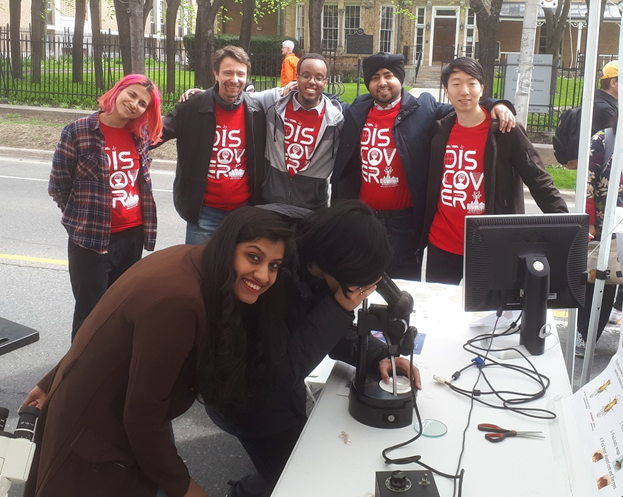 CSB has had an engaged and enthusiastic team every year to host our booth at the annual Science Rendezvous street festival on St George Street (2018 festival pictured here). We present models of plant and animal cells, show fly mutants and exhibit plant pathogens. Visitors range from elementary students eager to learn about the inner workings of the cell through high school students looking to choose a program and on to curious alumni of all ages. This year’s Science Rendezvous took place on May 11th; please visit us next year in Toronto or go to any of the other Science Rendezvous events around Canada: https://www.sciencerendezvous.ca/.
CSB has had an engaged and enthusiastic team every year to host our booth at the annual Science Rendezvous street festival on St George Street (2018 festival pictured here). We present models of plant and animal cells, show fly mutants and exhibit plant pathogens. Visitors range from elementary students eager to learn about the inner workings of the cell through high school students looking to choose a program and on to curious alumni of all ages. This year’s Science Rendezvous took place on May 11th; please visit us next year in Toronto or go to any of the other Science Rendezvous events around Canada: https://www.sciencerendezvous.ca/.
Professor John Peever spoke about his research into the neurobiology of sleep on The Agenda from TVO. He aims to understand the mechanisms underlying behavioural arousal states (e.g., wakefulness, REM sleep, non-REM sleep) and the mechanistic changes that occur in sleep disorders such as narcolepsy and REM sleep behaviour disorder.
Professor Peever was also the guest in a FutureTech Health Podcast on “Understanding the Restorative Nature of Sleep”. Links to the podcast can be found at http://uoft.me/PeeverPodcast.
In addition to our presence at Science Rendezvous, CSB also supports the activities of iGEM Toronto (https://igemtoronto.ca/) and Let’s Talk Science (http://letstalkscience.ca/). At the Let’s Talk Science Challenge in Hart House May 6th, 2019, Professor Chris Garside prepared an educational presentation on Insect Respiration for middle school students, and Professor Rodrigo Fernandez-Gonzalez‘ students presented fluorescent fruit flies, including bright beating heart cells. You can read more about this event here: https://uoft.me/CSBatLTS2019.
Undergraduate CSB students produced a series of videos about the Department under the direction of Professor Ashley Bruce. These videos can be found at https://popuoft.wixsite.com/popcsb; they detail potential careers in science, share conversations with alumni, faculty, staff and students, and give tips for finding opportunities for research in the Department.
